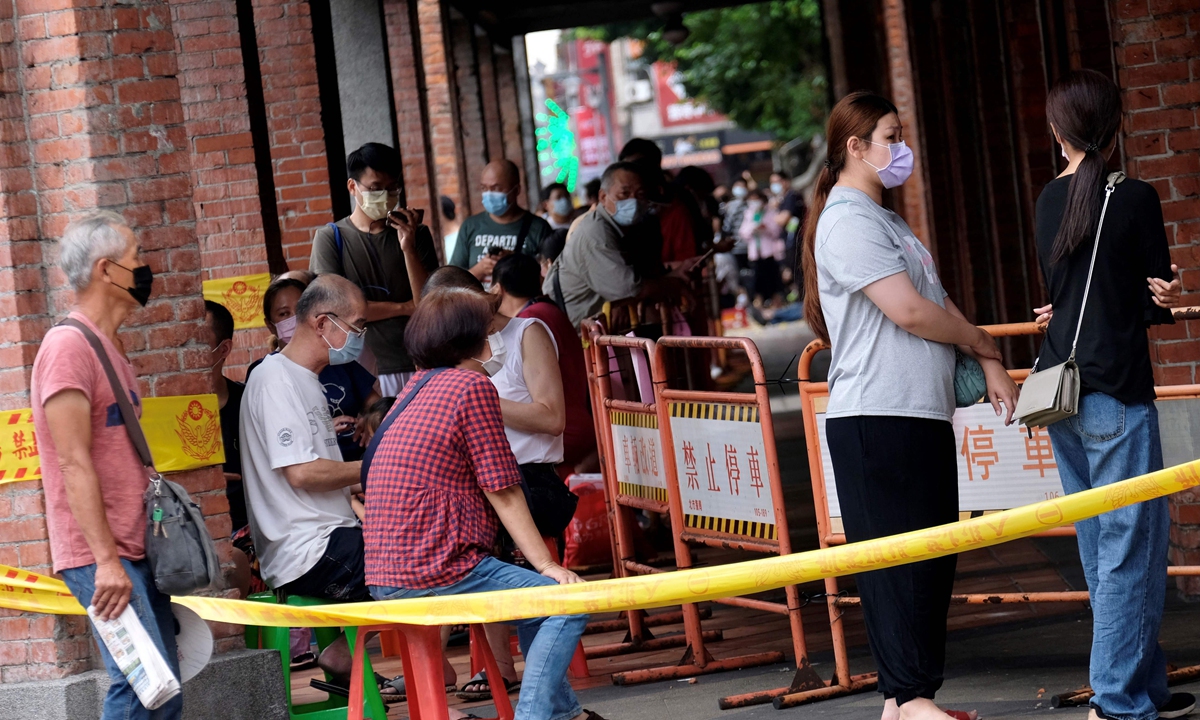
Residents on the island of Taiwan line up and wait for getting a COVID-19 nucleic acid test in Taipei on Tuesday. Testing on the island is 21 times more expensive than the mainland, hindering epidemic control of the island, which reported 240 new infections Tuesday after a record of 333 cases the previous day. Photo: VCG
Experts in the Chinese mainland and the island of Taiwan urged the Democratic Progressive Party (DPP) authority on the island to stop putting political interests above people's lives and conduct mass nucleic acid testing, as the COVID-19 case fatality rate (CFR) on the island has exceeded 4 percent, almost double the world average.
Taiwan reported 129 new locally transmitted COVID-19 infections and six deaths on Thursday, bringing the total number to 14,398 cases and 605 deaths.
Although the head of Taiwan's health authority, Chen Shih-chung, recently said that the surge "is gradually being tamed," he announced on Wednesday that the level-3 emergency alert will be extended to July 12.
Freeman Chen, a professor at National Taiwan University of Science and Technology, said Monday on Facebook that Taiwan's high CFR and the increase in cremations, which exceeded 55 percent of the same period last year, suggest that the actual number of infections in the island is much higher than the announced numbers.
The actual number of infected people in Taiwan must be multiplied by at least 2.55, the professor said. He pointed out that the current fiasco was caused by the "rejection of mass testing," which serves the DPP's face-saving project while sacrificing innocent people's lives.
Taipei mayor Ko Wen-je on Thursday said that the high CFR indicates a large number of undetected infections, as the medical standard in Taiwan is above the world average.
Yang Zhanqiu, deputy director of the pathogen biology department at Wuhan University, told the Global Times on Thursday that in general, a high CFR is associated with a high rate of severe illness, which indicates that infected patients have not been isolated and treated in a timely manner.
Chang Ya-chung, a Taipei-based political scientist and member of the Kuomintang, told the Global Times on Thursday that the high CFR in Taiwan was mainly due to the lack of mass screening.
The DPP authority has yet to conduct universal nucleic acid testing and set up makeshift hospitals for quarantine, which means no enough buffers between the onset of infections and severe cases, said Chang, noting that as the above measures have proved to be the "success of the Chinese mainland," the DPP is unwilling to follow up for political consideration.
It will be too late for infected patients to turn to the overload hospitals in Taiwan, after severe symptoms surface, Chang said.
Wang Jianmin, a senior cross-Straits expert at Minnan Normal University, Fujian Province, told the Global Times on Thursday that politicizing the vaccines issue also contributed to Taiwan's high mortality rate.
The mainland vaccines have been proven to be safe and effective, but the DPP has rejected them for political reasons and relied only on small donations. However, the reported side effects of the AstraZeneca vaccine has led to the rejection mentality of some Taiwan residents toward the vaccine, Wang said.
"The only way to protect myself is to stay at home… it's like a dilemma now [of receiving AZ doses or risking infection] as I would like to wait until more available choices, maybe from the mainland," a Taipei-based resident surnamed Chou told the Global Times on Thursday.
178 Taiwan residents have died from adverse reactions since the inoculation campaign rollout in Taiwan on June 15. The island of 23 million people now has a first dose vaccination rate of 7 percent.
As for the Delta variant of the COVID-19 which has spread to over 90 countries and regions, observers said Taiwan is unlikely to be the exception, so the death toll and even death rate may continue to rise if the island makes no change to medical and screening capacity.
And it seems that the DPP has yet to devote resources to epidemic prevention, even when they face such a high death rate.
The island's defense authority on July 17 announced two arms procurement deals with the US, including one "long-range precision fire system" and "a batch of missiles," Taiwan media reported.
The DPP also funded and controlled secessionist media in Taiwan to defend the Tsai Ing-wen authority amid public discontent, Wang said, citing an island source.
The DPP authority has always flagged so-called democracy and human rights and attacked the mainland, but in the current mess, people's lives, which are the most basic human right, are ignored in front of the DPP's political interests, Wang said.
"When people reflect on this history, they will hold Tsai and the DPP accountable for the epidemic fiasco and humanitarian disaster caused by their anti-mainland manipulation," Wang said.




